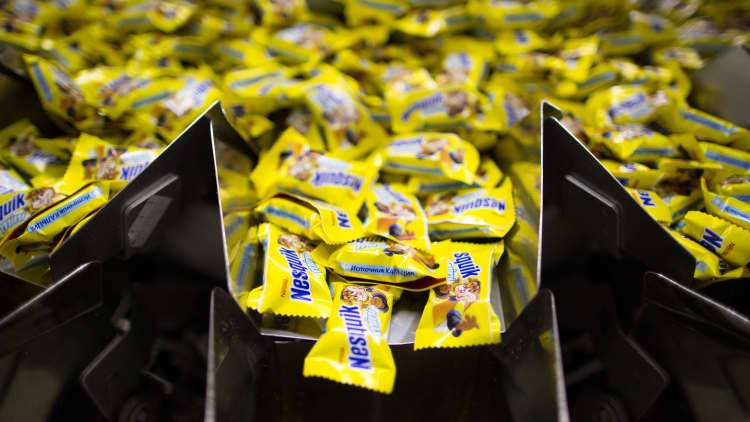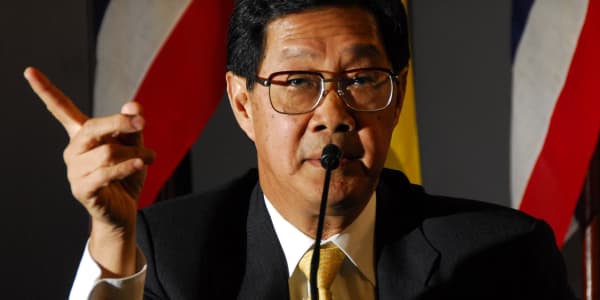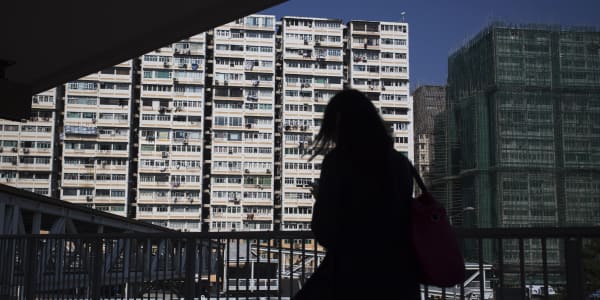
The world will run out of fresh water long before it runs out of oil, with the potential for major deficits by 2030, the chairman of bottled water giant Nestle said.
"We have a major water management crisis," Peter Brabeck-Letmathe told CNBC on the sidelines of the Credit Suisse Asian Investment Conference on Tuesday. "We are destroying 20 percent more water for human consumption than there is available."
Around 1.2 billion people, or almost one-fifth of the world's population, live in areas of physical scarcity, and 500 million people are approaching this situation, according to data from the United Nations. Another 1.6 billion people, or almost one quarter of the world's population, face economic water shortage.
In addition to reducing the company's water consumption by more than 60 percent over the past few years even as it increased production, Nestle has been working with governments to find better ways to use water sustainably, he said.
A risk
It's not an entirely altruistic step for the company, which had an around 12 percent share of the bottled water market globally in 2013, according to data on its website.
"For a food company like Nestle, this is a direct and an indirect risk. The entire value chain is exposed to it, from the farmers which have been producing our raw materials up to the consumers," Brabeck-Letmathe said in a presentation at the conference. "This is the reason we got involved in the water issue."
Within the company, Nestle has created a "shadow price" for water for its operations locally, to ensure it's given a value to make it psychologically more difficult to waste, said Brabeck-Letmathe.
Political concern
Charging for water can be a lightning rod for political criticism amid concerns that the poor will lose access to a necessity.
"Water is a human right. I fully agree with that," Brabeck-Letmathe said, noting that the around 30 liters a day needed for basic living should be provided without charge to those who can't afford it. But that amount is only accounts for around 1.5 percent of the fresh water destroyed daily, he said.
Read MoreCalifornia drought can't stop production of bottled water
He's more concerned about the other 98.5 percent. "I don't think it's a human right to fill up a swimming pool. I don't think it's a human right to wash cars. I don't think it's a human right to water a golf course," he said.
Growing investment gap
In addition to general concerns about wasteful use, Brabeck-Letmathe noted that water infrastructure has a growing investment gap, estimating the global minimum needed is around $770 billion a year, with the annual deficit running at around $250 billion.
"Infrastructure is falling apart," he said, adding it's not just an emerging market problem, with around 35 percent of water in London lost due to poor infrastructure.
Criticism
To be sure, despite the advocacy on the issue, Nestle has faced criticism for its use of water.
In California, which is suffering through an around three-year-long drought of historic proportions, the company has continued to produce bottled water.
About 1.39 liters of water is needed to make one liter of bottled water, according to the industry trade group, the International Bottled Water Association.
While the state has introduced some harsh restrictions, including fines of up to $500 for overwatering lawns, Nestle has largely sidestepped them by purchasing its water from a spring in Millard Canyon, California, some 80 miles east of Los Angeles, located on the Morongo Indian Reservation. Because the reservation is considered a sovereign nation, it's not under any obligation to comply with state laws concerning the drought. Critics have also pointed to concerns over Nestle shipping the bottled water out of the parched state.
"We regularly engage with Tribal water officials on the current drought situation and water resource management at Cabazon to ensure the long-term sustainability of this water supply," Nestle told CNBC via email. It said the bottling facility's water use is around 0.2 percent of total water demand in the neighboring Coachella Valley.
--Mark Koba contributed to this article.





